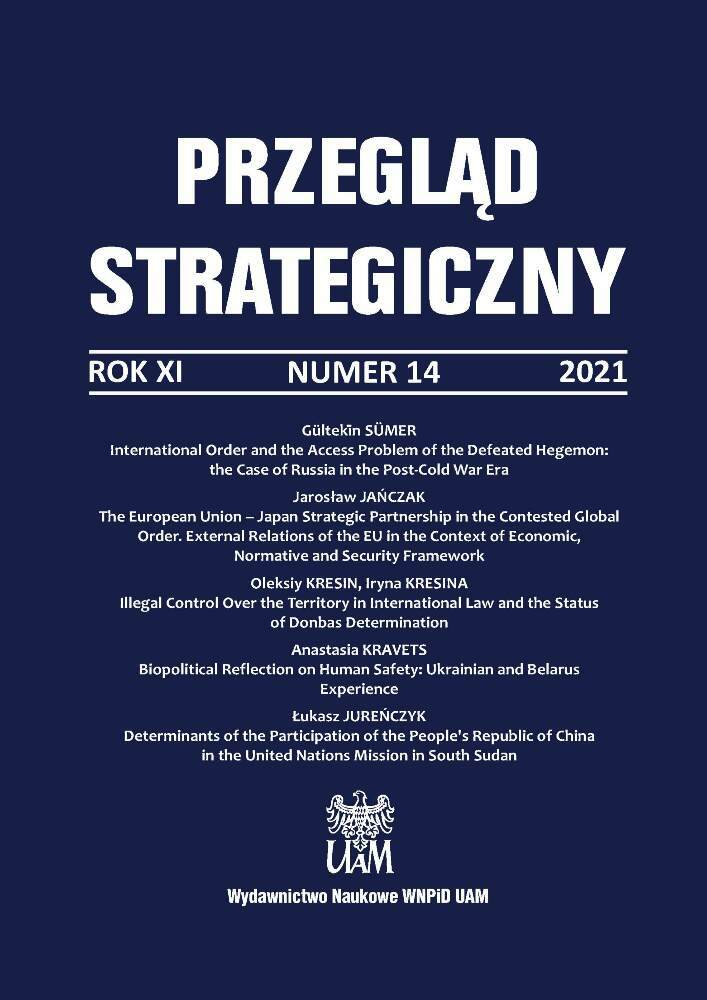Abstract
Biopolitical reflection is seen as a way of understanding the specifics of being “bios politicos.” It’s means as the understanding the transformational processes in bios and involve the appropriate political reaction, and internal changes “bios politicos,” its self-realization as a subject and object of policy, able to initiate profound transformations of politics and power in biopolitics and biopower. The concept of “bios politicos,” his life, freedom and safety are in the focus of scientific analysis. The key question: сan “bios politicos” exist and function effectively in conditions of danger, in conditions where every word, every action that is unacceptable to the disciplinary authorities can lead to punishment or even death? The aim is to prove that politics and power in the 21st century in Europe cannot and should not exist in a disciplinary form. Their transformation is possible due to the activity of a person as a conscious subject of social and political activity. The complex nature of the scientific problem involves the use of appropriate methods that combine different types of systems analyses: system-structural analysis, system-functional, system-historical analysis, as well as the method of rational reconstruction and prognostic method. The key hypothesis is that today Ukraine is very close (or seeks to get closer) to the implementation of the concepts of biopolitics and biopower. 2014 is certainly an illustration of the “bios politicos” resistance to disciplinary action, despite disciplinary techniques, including the threat of death. Belarusian society, after the 2020 presidential election, has shown such a high level of consolidation and awareness, non-acceptance of disciplinary techniques in the form of threats, violence, and punishment, that we can assume the beginning of transformational change. It is biopolitics and biopower today that is the response of the conscious subject – “bios politicos” to the crisis of disciplinary power, its techniques of domination, control, and violence. Biopolitics and biopower allow “bios politicos” to exist and develop freely in their country, to realize their knowledge and aspirations, to be realized in all spheres of life knowing that the main task of the state is to protect his life and freedom.
References
Blank R. (2014), Biology and politics: an introduction. Politics and the life science: the state of discipline, United Kingdom.
Сhomu stukhly protesty u Bilorusi i shcho tse oznachaie – ohliad ZMI (2020), https://www.bbc.com/ukrainian/press-review-54905097 (29.05.2021).
Esposito R. (2008), Bios. Biopolitics and Philosophy, Minneapolis.
Fuko M. (2005), Nuzhno zashchyshchat’ obshchestvo: kurs lektsyy prochytannyh v Kollezh de Frants v 1975–1976 uchebnom hodu, Sanct Petersburg.
Fuko M. (2010), Rozhdenye byopolytyky: kurs lektsyy, prochytannykh v Kollezh de Frans v 1978–1979 uchebnom hodu, Sanct Petersburg.
Kostyuchkov S. (2016), Mistse i rol’ suchasnoyi lyudyny u planetarnomu butti: biopoltychna interpretatsiya, http://ekhsuir.kspu.edu/bitstream/123456789/3176/1/23.pdf (14.06.2020).
Kostiuchkov S. (2016), Biopolitychni kontseptsii yak rezultat implikatsii biolohichnoho i sotsialno-filosofskoho znannia, http://ekhsuir.kspu.edu/bitstream/123456789/3157/1/4.pdf (14.06.2020).
Kryvitchenko O. (2014), Yevromaydan-maydan yak biopolitychni spil’nosti novoho typu, shcho samoorhanizuyut’sya, “Hrani”, No. 6.
Lazzarato M. (2000), From biopower to biopolitics, http://www.generation-online.org/c/fcbiopolitics.htm (14.06.2020).
Negri А. (2007), The Labor of the Multitude and the Fabric of Biopolitics, “Mediations”, http://www.mediationsjournal.org/articles/the-labor-of-the-multitude-and-the-fabric-of-biopolitics (14.06.2020).
Panchenko Yu. (2021), Lukashenko yde u nastup: shcho stalosia iz protestamy u Bilorusi, https://www.eurointegration.com.ua/articles/2021/03/29/7121478/ (29.05.2021).
Shevchuk D. (2013), Polityzatsiya zhyttya v konteksti biopolityky: sotsial’no-filosofs’kyy analiz, “Naukovi zapysky”, Vol. 13.
Somit А., Peterson S. (2005), The Failure of Democratic Nation Building: Ideology Meets Evolution, New York.
Peterson S., Somit A. (2011), Biology and politics: The cutting edge, United Kingdom.
Potapenko Ya. (2018), Retseptsiia Yevromaidanu v suchasnomu ukrainskomu sotsiokulturnomu dyskursi, https://ipiend.gov.ua/wp-content/uploads/2018/07/potapenko_retseptsiia.pdf (29.05.2021).
Tukalenko I. (2015), Vplyv biopoltychnykh transformatsitsy na evolyutsiyu prav lyudyny, “Hileya”, Vol. 100.
Vannek L. (2021), Internet-tekhnolohii u protestakh v Ukraini ta Bilorusi: tendentsii i porivniannia, https://www.radiosvoboda.org/a/internet-tekhnolohiyi-u-protestakh-v-ukrayini-ta-bilorusi/31082739.html (29.05.2021).
Human security in theory and practice (2009), https://www.unocha.org/sites/dms/HSU/Publications%20and%20Products/Human%20Security%20Tools/Human%20Security%20in%20Theory%20and%20Practice%20English.pdf (20.05.2021).

